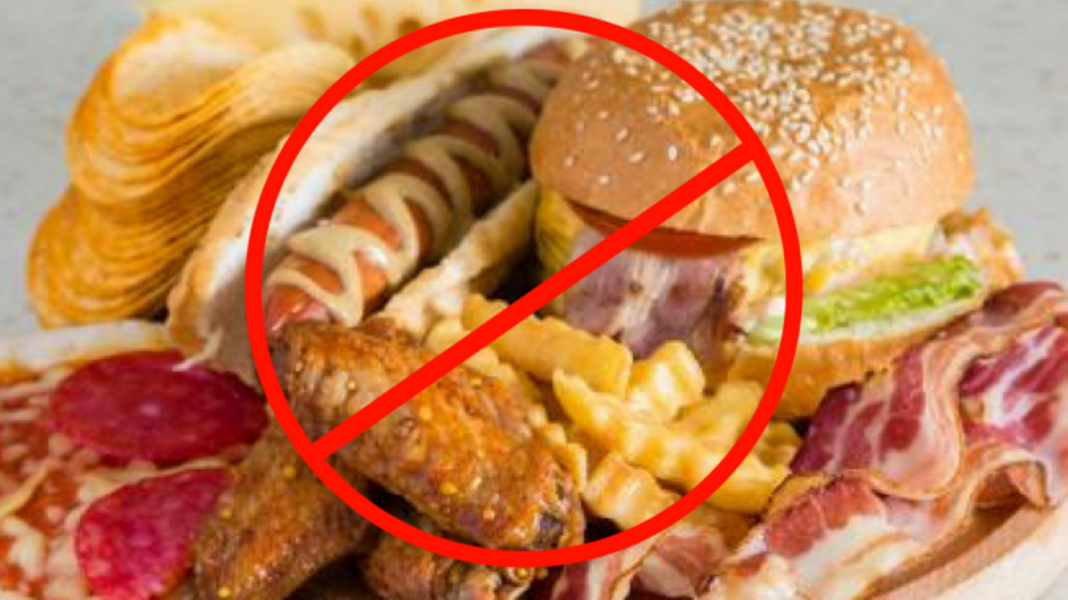What Is Hypertension/High Blood Pressure?
Blood pressure is the force of blood pushing against blood vessel walls. The heart pumps blood into the arteries (blood vessels) which carry the blood throughout the body.
High blood pressure, also called hypertension, means the pressure in your arteries is above the normal range. In most cases, no one knows what causes high blood pressure. What you eat can affect your blood pressure.
Over time, high blood pressure can cause blood vessel damage that leads to heart disease, kidney disease, stroke, and other problems. Hypertension is sometimes called the silent killer because it produces no symptoms and can go unnoticed — and untreated for years.
According to the Centers for Disease Control and Prevention Trusted Source (CDC), an estimated 75 million Americans have high blood pressure. Many risk factors for high blood pressure are out of your control, such as age, family history, gender, and race. But there are also factors you can control, such as exercise and diet. A diet that can help control blood pressure is rich in potassium, magnesium, and fiber and lower in sodium.
What Is a High Blood Pressure Crisis
High blood pressure crisis is a serious increase in blood pressure that can lead to deadly conditions like:
- stroke or heart attack
- Loss of speech or memory loss
Only a few people survive the high blood pressure deadly crisis. This is because they check regularly their blood pressure readings and take the necessary drugs or solutions to permanent its stability.
- Normal blood pressure is: 120/80 mmHg
- Hypertension is: 140/90 mmHg
- The hypertensive crisis begins here: 180/120 mmHg
What Are The Causes of High Blood Pressure/Hypertension?
Being overweight or obese-Mental Stress-Smoking-Diabetes-High Salt intake-High Fat Diet-Sleep apnea-Excess alcohol-Genetics-Physical Inactivity-Adrenalin and thyroid disorder-Psoriasis-Poor eating habits
A blood pressure reading has a top number (systolic) and a bottom number (diastolic). The ranges are:
- Normal: Less than 120 over 80 (120/80)
- Pre-Hypertension: 120-139 over 80-89
- Stage 1 High Blood Pressure: 140-159 Over 90-99
- High blood pressure in People Over Age 60: 150 and above over 90 and above
What Are The Types Of High Blood Pressure?
- Primary (also called essential) high blood pressure. Causes of this most common type of high blood pressure include aging and unhealthy habits like not getting enough exercise.
- Secondary high blood pressure. Causes of this type of high blood pressure include different medical problems (for example kidney or hormonal problems) or sometimes a medication you’re taking.
Read Also: 7 Amazing Benefits of Fruit Salad
High Blood Pressure Foods To Avoid
Limiting these foods may help manage your blood pressure.
1. High Blood Pressure Food to Avoid: Salt or sodium
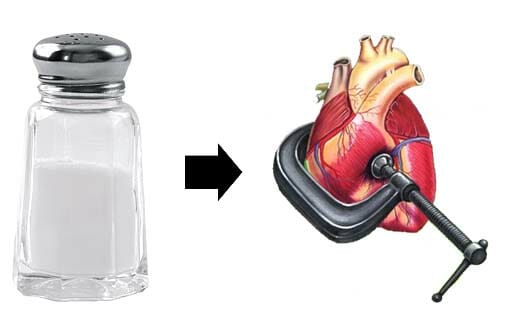
Salt, or specifically the sodium in salt, is a major contributor trusted source of high blood pressure and heart disease. This is because of how it affects fluid balance in the blood. Table salt is around 40 percent sodium. Some amount of salt is important for health, but it’s easy to eat too much.
Most of the sodium in the American diet comes from packaged, processed food rather than what you add to the table. Sodium may be hidden in unexpected places.
The following foods, known as the “salty six,” are major contributors trusted sources of people’s daily salt intake:
- Bread and rolls
- Pizza
- Sandwiches
- Cold cuts and cured meats
- Soup
- Burritos and tacos
2. High Blood Pressure Food to Avoid: Deli meat
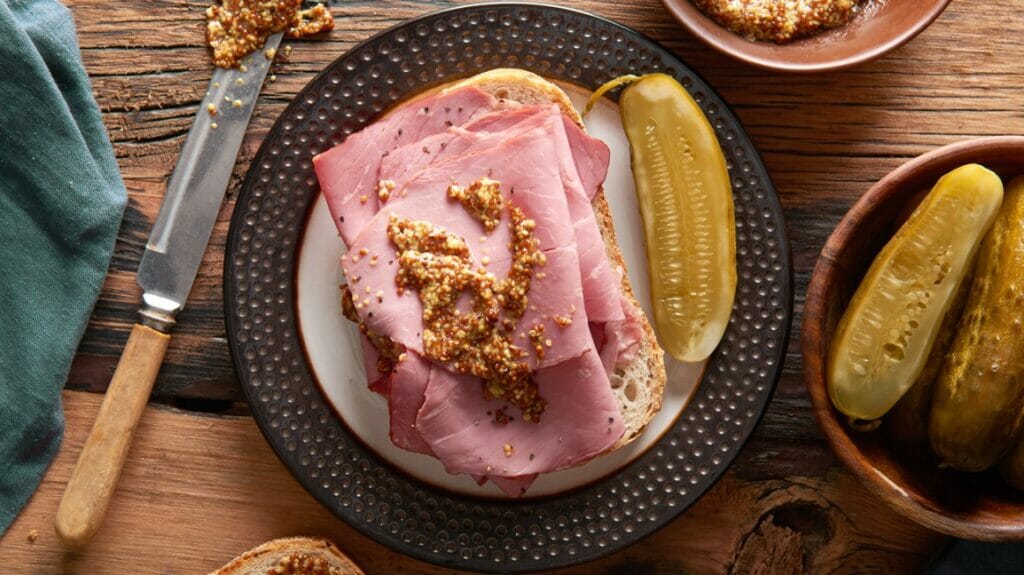
Processed deli and lunch meats are often packed with sodium. That’s because manufacturers cure, season, and preserve these meats with salt.
According to the U.S. Department of Agriculture (USDA) database, just two slices of bologna contain 910 mg of Trusted Source of sodium. One frankfurter, or hot dog, contains 567 mg
Adding other high salt foods, such as bread, cheese, various condiments, and pickles, means that a sandwich can easily become very high in sodium.
3. High Blood Pressure Food to Avoid: Frozen pizza
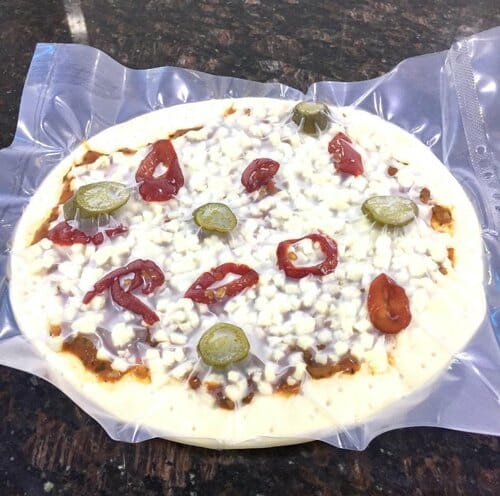
The combination of ingredients in frozen pizzas means they’re high in sugar, saturated fat, and sodium. Frozen pizza can have especially high levels of sodium.
Cheese is often high in sodium. Just two slices of American cheese contain 512 mg of sodium. This is generally in combination with salty or sugary pizza dough and crust, cured meats, and tomato sauce.
To maintain flavor in the pizza once it’s been cooked, manufacturers often add a lot of salt. One 12-inch pepperoni pizza, cooked from frozen, contains 3,140 mg of sodium, which is well above the daily limit of 2,300 mg.
As a substitute, try making pizza at home, using homemade dough, low sodium cheese, and your favorite vegetables as toppings.
4. High Blood Pressure Food to Avoid: Pickles
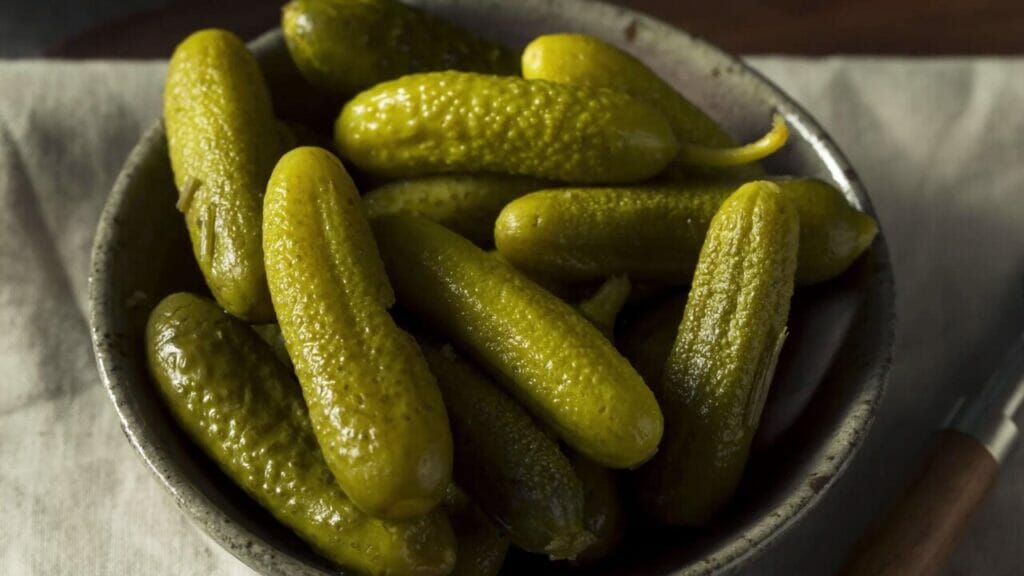
Preserving any food requires salt. It stops the food from decaying and keeps it edible for longer. The longer vegetables sit in canning and preserving liquids, the more sodium they pick up. One small pickled cucumber contains 448 mg of sodium. That said, reduced-sodium options are available.
5. High Blood Pressure Food to Avoid: Canned soups
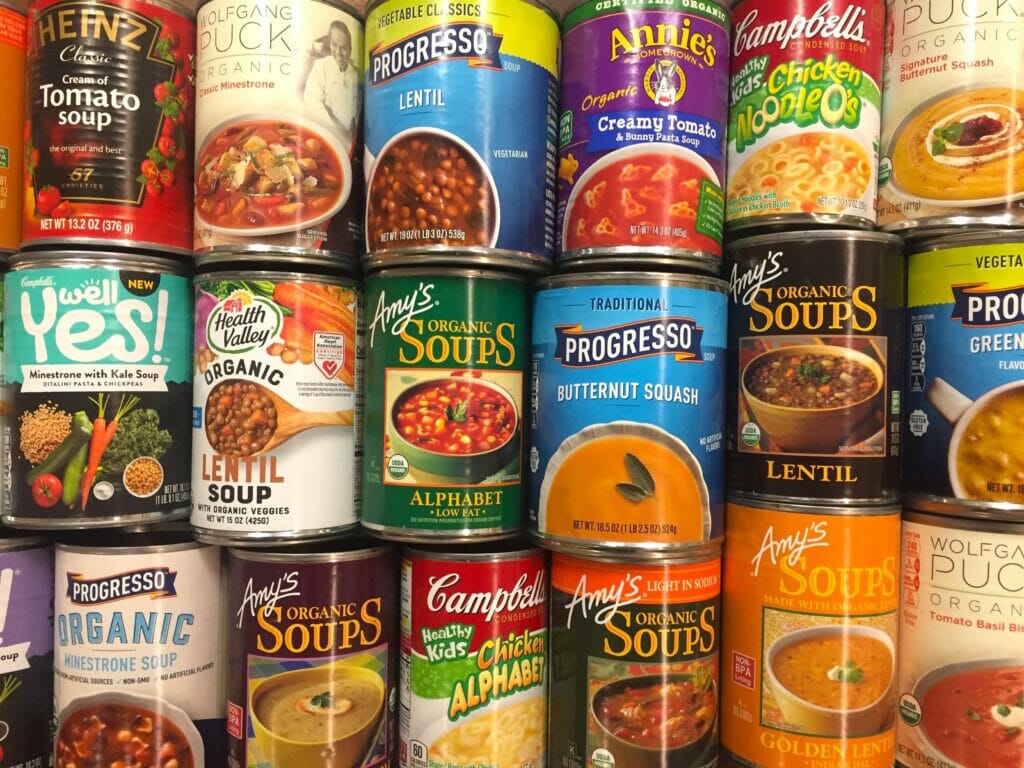
Canned soups are simple and easy to prepare, especially when you’re crunched for time or not feeling well.
However, canned soups are high in sodium. Canned and packaged broths and stocks may contain similar amounts. This means they can elevate your blood pressure. One can of tomato soup contains 1,110 mg of sodium, while a can of chicken and vegetable soup contains 2,140 mg. Try choosing low reduced-sodium soups instead, or make your soup at home from fresh ingredients.
6. Canned tomato products
Most canned tomato sauces, pasta sauces, and tomato juices are high in sodium. This means they can raise your blood pressure, especially if you already have high blood pressure. One serving (135 grams) of marinara sauce contains 566 mg of sodium. One cup of tomato juice contains 615 mg. You can find reduced-sodium sodium versions for most tomato products.
To lower your blood pressure, choose these alternatives or use fresh tomatoes, which are rich in an antioxidant called lycopene. Fresh vegetables have many heart-healthy benefits.
Read Also: 6 Simple Steps to Cure Toilet Infection
7. High Blood Pressure Food to Avoid: Alcohol
Drinking too much alcohol can increase your blood pressure. Alcohol increases blood levels of the hormone renin, which causes the blood vessels to constrict. This means that they get smaller in diameter. Renin also decreases how much fluid the body eliminates as urine. This combination of higher fluid levels in the body and smaller blood vessels increases blood pressure.
If you have high blood pressure, your doctor might recommend that you reduce the amount of alcohol you drink. Research from 2017 found a link between drinking less alcohol and lowering blood pressure among people who usually had more than two drinks each day.
In people who do not have hypertension, limiting alcohol intake may help reduce their risk of developing high blood pressure. Alcohol can also be blood pressure medication that you may be taking from working effectively through drug interactions.
In addition, many alcoholic drinks are high in sugar and calories. Drinking alcohol can contribute to overweight and obesity, which can increase the risk of hypertension.
According to the Journal of Clinical Hypertension, one drink of alcohol may raise blood pressure for at least 2 hours. If you regularly have more than two drinks, you could be at risk for long-term high blood pressure.
8. High Blood Pressure Food to Avoid: Red meat
Red meat is another High Blood Pressure Food to Avoid as it can raise a person’s blood pressure beyond normal. The process of metabolizing red meat in the body may also release compounds that elevate blood pressure even more.
The following are all red meats:
- Beef
- Lamb
- Pork
- Veal
- Goat
A person should try to limit red meats as much as possible or choose leaner cuts. The redder the meat in color, the more likely it is to increase blood pressure levels.
9. Caffeine, Soda, and energy drinks
Caffeine can temporarily elevate blood pressure, causing very high blood pressure readings. Caffeine from any source causes the blood vessels to constrict, which can raise blood pressure. Coffee, energy drinks, sodas, teas the list of caffeine-containing beverages is long. Before you consume any beverages that aren’t 100% water, read the label to review the caffeine information.
Even sugar-free sodas can still contain caffeine, so choose carefully. Energy drinks without caffeine may not be a good choice, either, since some of them are loaded with sugar. To improve your energy levels, try exercising regularly instead. It’s better for your overall heart health too.
People with hypertension should limit their caffeine intake. If you are a coffee lover, try switching to half coffee, or decaf if you can’t give it up completely. There are also caffeine-free teas available and certain varieties of tea have very low amounts of caffeine naturally.
People trying to limit their caffeine consumption may choose to drink less regular coffee or replace it with decaffeinated coffee.
The soda and caffeine mentioned above, are full of processed sugar and empty calories. Drinks with high sugar content are linked to increased rates of obesity for people of all ages. And people who are overweight or obese are at greater risk of developing high blood pressure. Women should limit added sugar to 24 grams per day and men should only have 36 grams per day at most, as recommended by the American Heart Association.
10. Sugar
Anyone with hypertension would do well to monitor their sugar intake. Studies of people with diabetes show some correlation between excessive sugar consumption and increased blood pressure. Even if you don’t have diabetes, avoiding added sugar in your diet is a smart decision.
To start, avoid soft drinks and canned fruit in syrup. Read labels to learn the total sugars contained in a packaged product. Aim to keep your sugar consumption at a minimum, and you may see your blood pressure numbers fall. Generally, too much sugar intake is unhealthy for the body, sugar intake in children helps their growth even if it should be taken moderately but not for an adult. Thus, it is advisable to take honey instead of sugar.
11. Seasonings and Sauces
When displacing table salt, do not fall into the trap of switching certain condiments instead. Things like ketchup, soy sauce, salad dressing, barbecue sauce, and steak sauce all have a lot of sodium in them. In other places, salt can be hidden in the sauce and gravy. Accustom yourself to several herbs and spices to add flavor to foods instead.
12. Salted Snacks
Many crackers, chips, and even sweets like cookies, are not good options. Other things to look out for include jerky and nuts. Those might seem like healthier snacks because they are sources of protein and healthy fats (in certain nuts), but for those with high blood pressure, they can be bad news. Look for varieties with no or very little salt added. Another good option if you are craving a crunchy snack, is popping your plain popcorn and adding (salt-free) spices to it yourself.
13. Fried Food
Fried foods contain a lot of saturated fat and salt, both of which you should avoid when you have high blood pressure. Grilling, baking, and sautéing are all good alternatives to frying. Air-fryers have become popular and are a good option as long as you pay attention to the salt content of what you’re cooking in the first place. Any kind of breading or seasoning mix should be low in sodium.
14. Foods with Saturated and Trans Fat
There are healthful fats you can have in your diet even with high blood pressure, but saturated and trans fats are not among them. Things fried in a lot of oils or meats that have a lot of fat are bad for both blood pressure and cholesterol.
Reduce or eliminate red meat consumption. If you do eat red meat, make sure you read the labels and choose the leanest cuts possible.
If you consume a lot of dairies, switch to low-fat versions. And be careful of cheeses with high salt content.
A Daily habits
Several lifestyle changes can help lower blood pressure and improve heart health, including:
- Quitting smoking, if applicable
- Reaching or maintaining a moderate weight
- Finding strategies to manage stress, such as meditation or journaling
A person should also get enough exercise where possible. Some people may need to start small and then gradually work up to more activity.
Conclusion:
A healthy diet is essential for lowering blood pressure and maintaining optimal levels, and research has shown that including certain foods in your diet, especially those high in specific nutrients like potassium and magnesium, reduces your blood pressure levels (1Trusted Source, 3Trusted Source).


